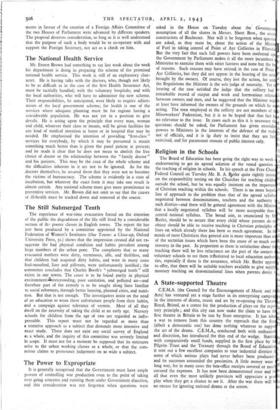The Still Submerged Tenth
The experience of war-time evacuation forced on the attention of the public the degradation of the life still lived by a considerable section of poorer classes in English towns. The report tht has just been produced by a committee appointed by the National Federation of Women's Institutes (Our Towns: a Close-up, Oxford University Press, 5s.) shows that the impression created did not ex- aggerate the bad physical condition and habits prevalent among large numbers of the urban poor. The complaints that so many evacuated mothers were dirty, verminous, idle, and thriftless, and that children had acquired dirty habits, and were in many cases foul-mouthed, liars and pilferers, were unfortunately justified ; the committee concludes that Charles Booth's " submerged tenth " still exists in our towns. The cause is to be found partly in physical environmentaovercrowding, poor sanitation, and polluted air—and therefore part of the remedy is to be sought along lines familiar to social reformers, through better housing, planned cities, and nutri- tion. But that is not enough. The investigators insist on the need of an education to wean these unfortunate people from their habits, and a campaign against tolerance of vermin. Most of all they dwell on the necessity of taking the child at an early age. Nursery schools for children from the age of two are regarded as indis- pensable. This report must not be regarded as more than • tentative approach to a subject that demands more intensive and exact study. There does not exist any social survey of England as a whole, and the inquiry of this committee was severely limited in scope. It must not for a moment be supposed that its strictures refer to the urban working classes as a whole, or that the com- mittee claims to pronounce judgement on so wide a subject.


























 Previous page
Previous page